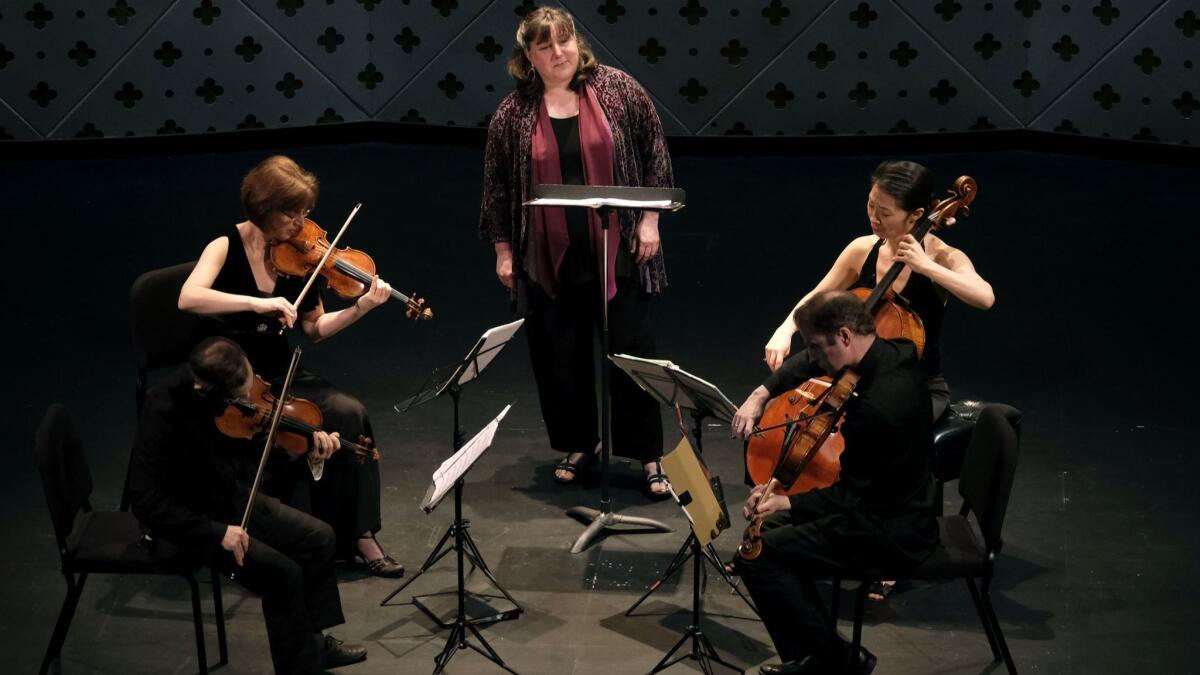Review: A new musical universe at, appropriately enough, Caltech

When Dawn Upshaw sang, “I feel the air from another planet,” at Caltech Sunday afternoon, it sounded like something you would expect to hear all the time around the campus and the control rooms at the Jet Propulsion Laboratory.
But this line, in German, happens to open Stefan George’s poem “Rapture,” which so inspired Arnold Schoenberg in 1908 that he added a soprano to his Second String Quartet, ending it with a setting of the poem. Breathing the radical air of scientific, philosophical and artistic fin de siècle Vienna, Schoenberg sought a new meaning for the musical universe.
The movement opens with nebulous string quartet sounds, the likes of which had never been heard before. The music has no classical form, and not until the end does it have any sense of the tonality that defined music. It was as incomprehensible to its early audience as the vision of the universe that Einstein had begun expounding. The riots at the first performance, Schoenberg recalled 20 years later, “surpassed every previous and subsequent happening of this kind.”
There were no riots Sunday in Caltech’s Beckman Auditorium. Just history. The concert by the Brentano String Quartet and Upshaw was the closing program of the 114th season of the Coleman Chamber Music series.
Four years before Schoenberg was inhaling planetary substances, a young pianist, Alice Coleman, was determined to give Pasadena a little culture. Coleman’s first concerts were in various venues, one being Hotel Green, but her father was a business manager at the Throop College of Technology, which became Caltech in 1920. Eventually, the series moved to campus, and after a hiatus away, returned after Beckman was built in 1964, and there it has remained.
A goodly number of the world’s great string quartets and chamber musicians have appeared in the series. At one point, pianist Leonard Stein, who had been Schoenberg’s secretary, ran a new music program associated with Coleman. Its competitions have propelled the careers of many a top ensemble, the Calder Quartet and Eighth Blackbird among the current crop.
Coleman might seem little long in the tooth these days. Some in the conservancy world liken Beckman to an ancient Roman theater, but it is a tired, circular, circus tent of a building with poor acoustics downstairs, somewhat better upstairs, and little sense of intimacy. The Coleman audience has the aura of an old-time Caltech crowd — slightly eccentric, exceptionally brainy and dedicated.
Top ensembles still appear. They know they can bring smart programs. Before the concert starts, you hear very little chatter. Just about everyone is reading the program notes, which are also old-school, detailed and elegantly written. The program is printed on good paper and with classy, tasteful fonts. The Coleman motto is: “the pleasure of musical company.”
The Brentano pretty much fits that mold. Founded in 1992 and now in residence at Yale, it has a glossy sound. In a more resonant hall, the quartet can produce more heft, but grace rather than drama has always been the Brentano’s hallmark.
The concert began with Respighi’s “Il Tramonto,” a kind of verismo-expressionist setting of Shelley’s gloomy “The Sunset” for soprano and string quartet. In the poem, a young woman’s lover suddenly dies after a night in the woods, and she lives out her life in uncomplaining madness, “a drop in a the deep sea of Love.” Brahms’ roiling First String Quartet, with its beefy textures and air not of other planets but earthy longing, followed.
After intermission, Mozart’s operatic, experimental “Dissonance” quartet, with its sneaky harmonies in the first movement made Schoenberg’s harmonic experiments 23 years later seem like a logical conclusion.
You might even say that the Brentano turned everything into logical conclusions. This is not a quartet for lingering but for sleek speed, careful control, certain elegance and sure direction.
Upshaw has always shared some of those advantages, as well has having been one of America’s most persuasive opera singers, known for making every word she sings register. She also had a unique voice that made her seem simultaneously grounded while maintaining a lightness that needed little propulsion to reach the ethereal upper atmosphere. She was the perfect American soprano.
Now in her mid-50s, Upshaw is not much of a presence on the concert scene. Her voice has thickened with time, which gave Respighi the kind of heft it needed. The emotions in her Schoenberg were intense. George’s other world is also one sought by the lovelorn, surrendering to “a sea of crystal radiance” (something else Caltech probably produces in its laboratories).
While Upshaw can convey the emotions ever vividly, vocally her soprano no longer swims in such radiance. Others, though, can take up that mantle. Much of her career is devoted to running the vocal program at Bard College, where she has her own laboratory to propel astonishing new singers, Julia Bullock being one. That is to say, the Upshaw force is very much still with us.
As is the Coleman, which has just announced its 115th season, making it surely the longest running such series in the country.
More to Read
The biggest entertainment stories
Get our big stories about Hollywood, film, television, music, arts, culture and more right in your inbox as soon as they publish.
You may occasionally receive promotional content from the Los Angeles Times.











